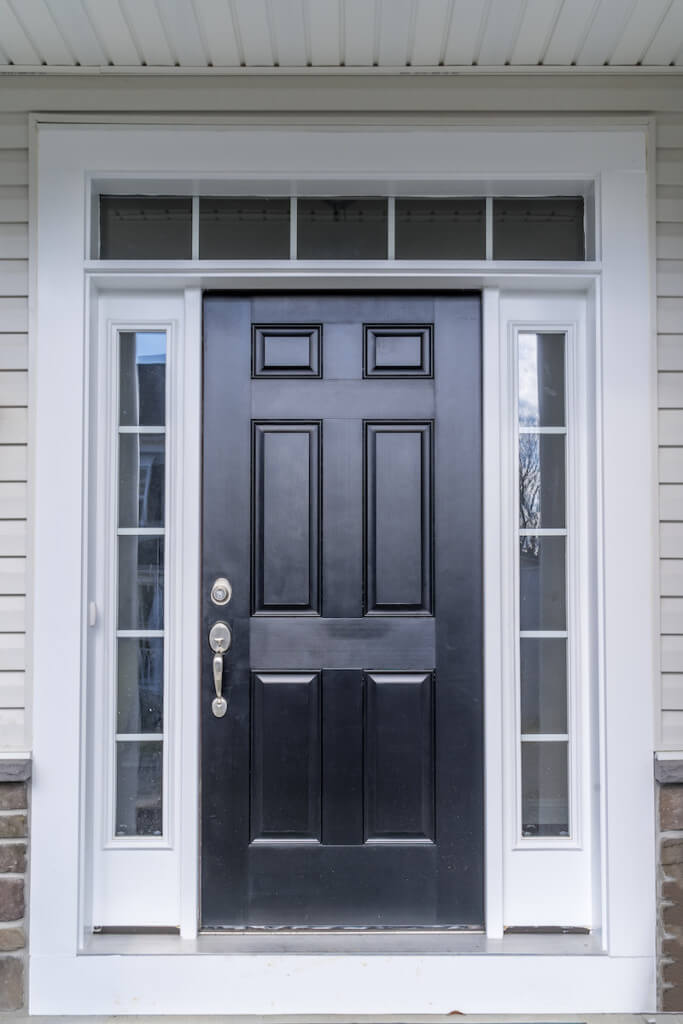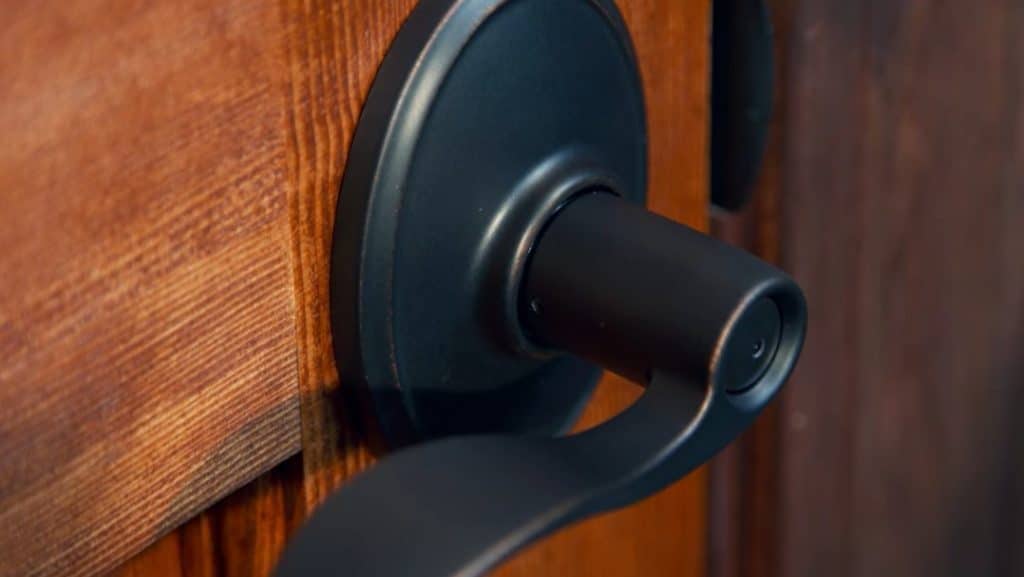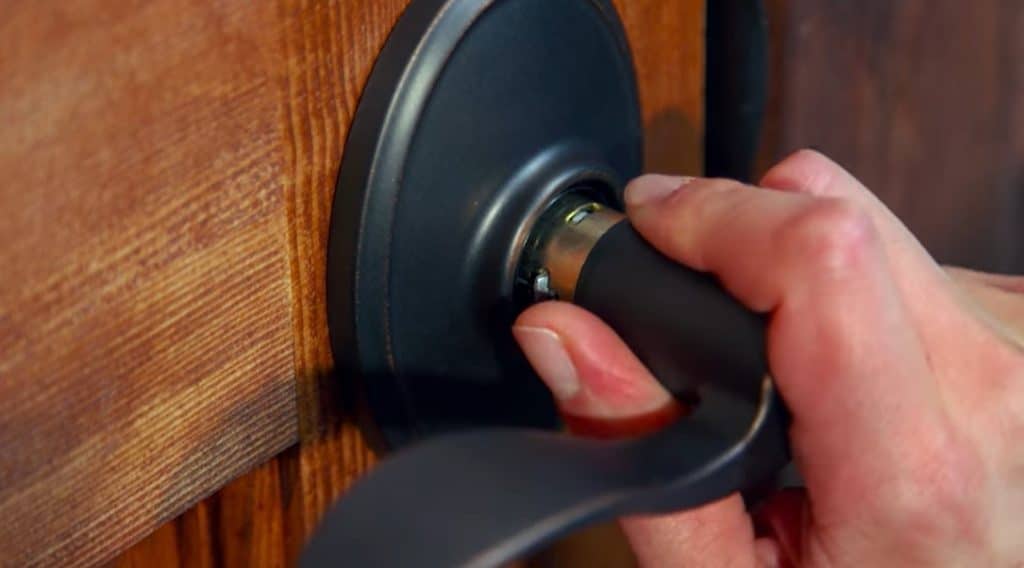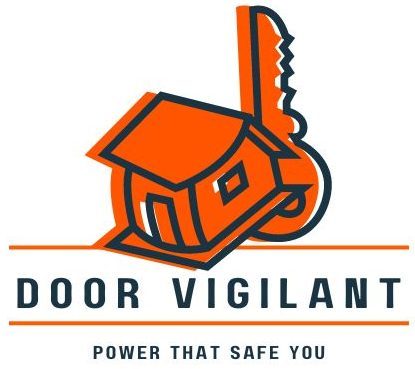A passage door lever is a type of door handle that is used on interior doors and does not have a locking mechanism. This type of lever is often used on closet doors, pantry doors, and other doors where a locking mechanism is unnecessary.
Passage door levers are a popular choice for homeowners due to their ease of use and simple design. They are often made of durable materials such as brass or stainless steel and come in a wide variety of styles to match any interior décor.
Installing a passage door lever is a straightforward process that can be completed with just a few basic tools. In addition to being practical, passage door levers can also add a touch of style to any room in your home.

Understanding The Basics Of Passage Door Levers
A passage door lever is a type of door handle designed with a non-locking mechanism, making it perfect for use in interior doors like closets, hallways, and bedrooms.
If you’re considering using this type of door handle in your home or at the office, then you need to understand the basics of passage door levers.
This will help you make informed decisions when it comes to installing and using them.
Definition Of Passage Door Lever
A passage door lever is a type of door handle that allows for the easy opening and closing of doors without the need for a locking mechanism. This makes it ideal for use on interior doors where privacy is not a concern.
How Passage Door Levers Work?
Passage door levers work by using a latch mechanism that is operated by turning the lever. When the lever is turned, the latch is retracted, allowing the door to be opened or closed.
The passage door lever doesn’t include a locking mechanism, so you can quickly and easily open and close the door without needing a key or code.
Differences Between Passage Door Levers And Other Types Of Door Handles
Passage door levers differ from other types of door handles in several ways, including:
Privacy door levers: Privacy door levers are similar to passage door levers, but they include a locking mechanism for added privacy. These handles are ideal for use in bathrooms, bedrooms, and other areas where privacy is essential.
Keyed door levers: Keyed door levers come with a locking mechanism that requires a key to open or close the door. They are ideal for use on exterior doors where security is a significant concern.
Dummy door levers: Dummy door levers are non-operational door handles that are used as a decorative feature to enhance the appearance of a door. Unlike passage door levers, they do not include a latch mechanism and are not used for opening or closing doors.
Now you know the basics of passage door levers, including what they are, how they work, and the differences between them and other types of door handles. With this knowledge, you can make an informed decision about whether to install passage door levers in your home or workplace.
The Benefits Of Choosing A Passage Door Lever
Passage door levers are a popular choice for homeowners and interior designers alike. They are simple, elegant, and functional, making them the perfect addition to any home or office. In this section, we will discuss the benefits of choosing a passage door lever.

Easy To Operate
One of the primary benefits of a passage door lever is how easy it is to operate. Unlike traditional doorknobs, passage door levers require very little effort to open. This makes them an excellent choice for those who may have difficulty gripping or turning a doorknob.
- The lever design allows for a simple push or pull motion, making it ideal for individuals with mobility issues.
- Children can easily operate a passage door lever, which can help prevent accidents and injuries.
- Elderly individuals, who may have weaker hands or wrists, will appreciate the ease of use provided by passage door levers.
Perfect For Interior Doors
Passage door levers are ideal for interior doors. They offer the perfect amount of privacy and security without the need for a locking mechanism. Here are some reasons why they are the perfect choice for interior doors.
- Interior doors don’t require the same level of security as exterior doors, making a passage door lever a fantastic alternative to a traditional lock and key.
- They allow for easy movement between rooms, which is particularly useful in a busy household.
- Passage door levers are ideal for shared spaces, such as a family room or kitchen, where privacy is less of a concern.
Durable And Long-Lasting
Passage door levers are designed to be durable and long-lasting. They are made from high-quality materials that can withstand regular use. Here are some reasons why you can rely on a passage door lever for years to come.
- They are often made from solid metal, which provides a sturdy construction.
- The design of a passage door lever is simple, meaning there are fewer parts to wear down or break over time.
- They are often designed with a protective coating that can resist the effects of rust and corrosion, extending the lifespan of the lever.
Stylish And Aesthetic Additions To Your Home
Lastly, passage door levers are a stylish and aesthetic addition to any home. They are available in a range of finishes and designs, meaning you can find a lever that complements your existing décor. Here are some reasons why they can be a stylish addition to your home:
- They can add a touch of elegance to any room, whether you choose a traditional or modern design.
- Passage door levers can coordinate with other hardware in your home, such as faucets, lighting fixtures, and cabinet handles.
- A passage door lever can be a subtle but noticeable addition that can elevate the overall look of your home.
Choosing a passage door lever is an excellent choice for anyone looking for an easy-to-use, functional, long-lasting, and stylish addition to their home or office.
Choosing The Right Passage Door Lever For Your Home
When it comes to choosing the right passage door lever for your home, there are several factors to consider. A passage door lever is a type of door handle that does not have a locking mechanism and is commonly used for interior doors.
Here are some key points to keep in mind when selecting a passage door lever.
Material:
The material of the door lever is an important factor to consider, as it can affect the durability and style of the handle. Some common materials include:
- Brass: A popular choice for its classic and durable design.
- Stainless steel: Known for its strength and resistance to corrosion.
- Zinc: A cost-effective option that can come in a variety of finishes.
Style And Finish:
The style and finish of the passage door lever can greatly impact the overall aesthetic of your home. Here are some popular styles to consider:
- Traditional: Typically seen in brass or oil-rubbed bronze finishes, these handles have a classic and timeless look.
- Modern: Often seen in sleek and simple designs, modern door levers come in a variety of finishes and materials such as polished chrome and brushed nickel.
- Rustic: Rustic door levers often feature textured finishes and materials such as distressed wood or hammered metal.
Locking Mechanism:
Although passage door levers do not have a locking mechanism, some models may include a dummy knob or non-turning knob for consistency in design. If you want to add security to a room, you can install a separate deadbolt or keyed lock.
Some things to consider when choosing a locking mechanism include:
- Compatibility with the door: Ensure that the lock and door are compatible with each other in terms of size, thickness, and type of door.
- Security level: Choose the appropriate lock for the security level you need, whether it’s a standard lock or a high-security option.
Choosing the right passage door lever for your home can greatly elevate the overall style and functionality of your doors. Consider the material, style, finish, and locking mechanism when selecting a door lever to ensure it fits the needs of your household.
Installation And Maintenance Of Passage Door Levers
Passage door levers are widely used in modern homes and buildings, as they offer both functionality and style. These door levers provide an easy and convenient way to open and close doors without the need for a key.
Thus, installing a passage door lever can not only simplify the process but also add an element of elegance to the interior.

Installing A Passage Door Lever
Installing a passage door lever is a straightforward process that requires basic tools and good knowledge of the procedure. Below is a brief explanation of the pre-installation procedure and the installation procedure for passage door levers.
Pre-Installation Procedure
Before installing the passage door lever, it is essential to ensure that all the necessary tools and parts are available to avoid any inconvenience. The pre-installation procedure includes the following:
- Measure the door: Measure the thickness of the door to ensure that the installation kit is suitable for the door.
- Choose the right door lever: Consider the décor, style, and finish you want. Choose the door lever accordingly.
- Gather the necessary tools: Purchase and prepare all the tools required for the installation process. Common tools include a screwdriver, drill, measuring tape, hammer, and screws.
Installation Procedures
The installation process for the passage door lever is as follows:
- Unscrew the old door knob: Unscrew the old doorknob from the door and remove it carefully.
- Install the latch: Place the latch into the hole in the door and secure it with screws.
- Install the door lever: Insert the doorknob spindle into the latch and screw in the two halves of the doorknob onto the spindle.
- Test the door: After installation, test the door to ensure it works smoothly.
Maintenance And Cleaning Tips For Passage Door Levers
To ensure the door lever’s long-lasting performance, it is essential to maintain and clean it regularly. Here are a few tips for the proper maintenance of the passage door lever:
Proper Lubrication
Lubricate the door lever annually or whenever necessary to ensure smooth operation. Use silicone spray or graphite to lubricate the moving parts.
Care And Maintenance To Ensure Long-Lasting Performance
Regularly wiping out the door lever with a clean cloth, using a mild cleaning solution in case of stubborn dirt, and avoiding the use of harsh chemicals.
By following these simple installation and maintenance procedures, you can enjoy the benefits of a stylish and functional passage door lever in your home or office for years to come.
What Is The Difference Between A Passage Door Lever And A Privacy Door Lever?
Passage door levers are designed for rooms where privacy is not a concern, such as hallways, closets, and pantries. They do not have a locking mechanism and are typically used in conjunction with a deadbolt.
On the other hand, privacy door levers are used in rooms where privacy is crucial, such as bedrooms and bathrooms.
They come with a locking mechanism and can be locked from the inside using a thumbturn.
Can I Install A Passage Door Lever On An Exterior Door?
No, it is not recommended to install a passage door lever on an exterior door. Passage door levers are intended for interior use only. They do not have the required security features to withstand external factors such as weather changes and attempts at forced entry.
For exterior doors, it is recommended to use a lockset that has been rated for use on an external entry door.
Can I Rekey A Passage Door Lever?
Yes, many passage door levers are compatible with rekeying. Rekeying provides a cost-effective solution for homeowners who want to change the locks on their doors without having to replace the entire lockset.
However, it is important to note that not all passage door levers can be rekeyed.
Check with the manufacturer or a professional locksmith to determine if your lock is indeed rekeyable.
How Many Types Of Passage Door Levers Are Available?
Passage door levers are available in a variety of designs and finishes to match the decor of your home. There are many types of passage door levers, but they can be classified into the following categories:
- Standard passage levers
- Dummy passage levers (used on doors where no latch is needed)
- Two-point passage levers (used for french doors or double doors)
Passage door levers are an excellent addition to any home, providing both style and functionality. When choosing a passage door lever, it is important to consider the intended use of the door and the level of security required.
With the right passage door lever, you can improve the functionality and aesthetic appeal of your home.
Frequently Asked Questions
What Is A Passage Door Lever?
A passage door lever is a type of doorknob that operates without a lock or key.
How Does A Passage Door Lever Work?
A passage door lever operates by turning the lever or pressing down on it to open the door.
Where Is A Passage Door Lever Typically Used?
A passage door lever is commonly used on interior doors, such as closet doors and hallway doors.
What Are The Benefits Of A Passage Door Lever?
A passage door lever is easy to operate, has a sleek design, and is affordable compared to other door lever types.
Conclusion
The passage door lever is definitely the way to go if you want to add a bit of elegance and sophistication to your doors. This hardware is highly functional and resilient, allowing you to enjoy long-term use without worrying about wear and tear.
Its designs are also beautiful and can easily blend with any décor scheme you have. Whether you’re operating an office building, a residential apartment complex, or your own home, a passage door lever will elevate your door’s functionality and enhance its beauty.
As you explore different passage door lever models, you need to take your time and ensure you select the right fit for your door. With the right passage door lever, you’re guaranteed maximum convenience, ease of use, and improved privacy.
Remember to choose the right materials, finishes, and designs to ensure ultimate satisfaction.
